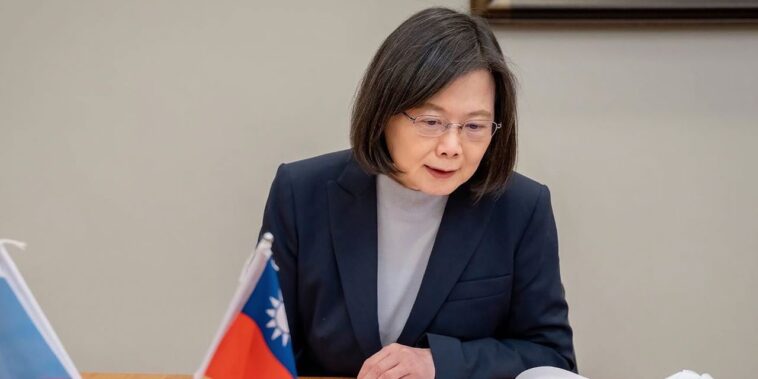Taipei: China and Honduras established formal diplomatic relations on Sunday, prompting Taiwan to accuse Beijing of using “coercion and intimidation” to woo away its last remaining allies.
The action was announced by China shortly after Tegucigalpa announced that it had officially severed ties with Taipei.
“The two governments have decided to recognize each other and establish ambassadorial-level diplomatic relations,” China’s foreign ministry announced in a statement.
The change reduces to thirteen the number of countries that still diplomatically recognize Taiwan, which has lost a number of Latin American allies over the past several years.
China views democratic, self-governing Taiwan as a part of its territory, to be reclaimed one day by force if necessary. Under its “One China” policy, it prohibits nations from recognizing both Beijing and Taipei.
According to a CCTV video, Honduran Foreign Minister Enrique Reina and his Chinese counterpart Qin Gang inked a joint communique in Beijing.
“China welcomes (Honduran) President Xiomara Castro’s early visit to China,” Qin said.
Previously, Reina stated that on Castro’s orders he had “communicated to Taiwan the decision to sever diplomatic ties.”
The ministry stated, “The government of the Republic of Honduras recognizes that there is only one China in the world and that the government of the People’s Republic of China is the only legitimate government that represents the entire country of China.”
Taiwan is an integral component of Chinese territory that cannot be ceded.
President Tsai Ing-wen of Taiwan stated that the change was “part of China’s coercion and intimidation” of Taiwan’s allies.
“China has long suppressed (Taiwan’s) international space, unilaterally endangering regional peace and stability,” her office said in a statement.
Qin stated in Beijing that China had “sternly reprimanded” the Taiwanese government for “engaging in activities that promote Taiwanese independence and separatism.”
There, Reina and Qin clinked champagne glasses in front of the flags of their respective countries. However, foreign ministry officials in Taipei had removed the blue-and-white banners of their former ally.
– “Pressure and coercion” –
Joseph Wu, the foreign minister of Taiwan, verified the severing of relations and accused China of offering “financial inducements” to woo the island’s allies away.
“After fruitless negotiations with (Honduras), we have decided to immediately sever diplomatic ties in order to preserve our national sovereignty and honor,” he said. We will discontinue all cooperation initiatives and terminate our embassy.
Wu reaffirmed Taiwan’s long-held perception of itself as a “independent sovereign nation.”
“Our nation will not yield to the pressure and intimidation of the Chinese dictatorship, and we will uphold the values of freedom and democracy,” he said.
Reina stated earlier this month that his country’s decision was motivated by economic necessity and that the Honduran government had asked Taiwan to increase financial aid and “realign” $600 million in debt owed to Taipei.
Sunday, Wu stated that Castro’s government had “requested billions of dollars in financial assistance.”
Honduras is one of the lowest nations in its region, with nearly 74% of its nearly 10 million inhabitants living in poverty. Tegucigalpa’s action followed hydroelectric dam construction talks with China.
China’s foreign ministry stated in a statement released on Sunday that Beijing “stands ready to expand friendly cooperation with Honduras in various fields for the mutual benefit of our two countries and peoples.”
– Declining popularity –
Since 1949, when China and Taiwan separated following a civil conflict, Latin America has been a crucial diplomatic battleground.
In recent years, Nicaragua, El Salvador, Panama, the Dominican Republic, and Costa Rica have all switched diplomatic recognition to Beijing, continuing a regional trend.
Despite having shifted recognition to Beijing in 1979, the United States continues to be Taiwan’s most important ally and largest arms supplier.
This week, Taiwan verified that President Tsai would visit Guatemala and Belize later this month, along with the United States. Guatemala and Belize are two remaining diplomatic allies.
Tsai will depart Taiwan on March 29 for a 10-day journey, making stops in New York and Los Angeles en route to and from Central American nations.
Also read: Elon Musk Offers $20 Billion in Stock Grants to Twitter Employees: Report
Analysts correlated the timing of Honduras’s change to Tsai’s visit.
Taiwanese political analyst Kuo Yu-jen from National Sun Yat-sen University stated, “It appears China is punishing Taiwan and President Tsai for making the US transit visit.”
“This is a warning before Tsai’s March 29 trip to Central America, and I believe China will make additional diplomatic moves during her trip.”




